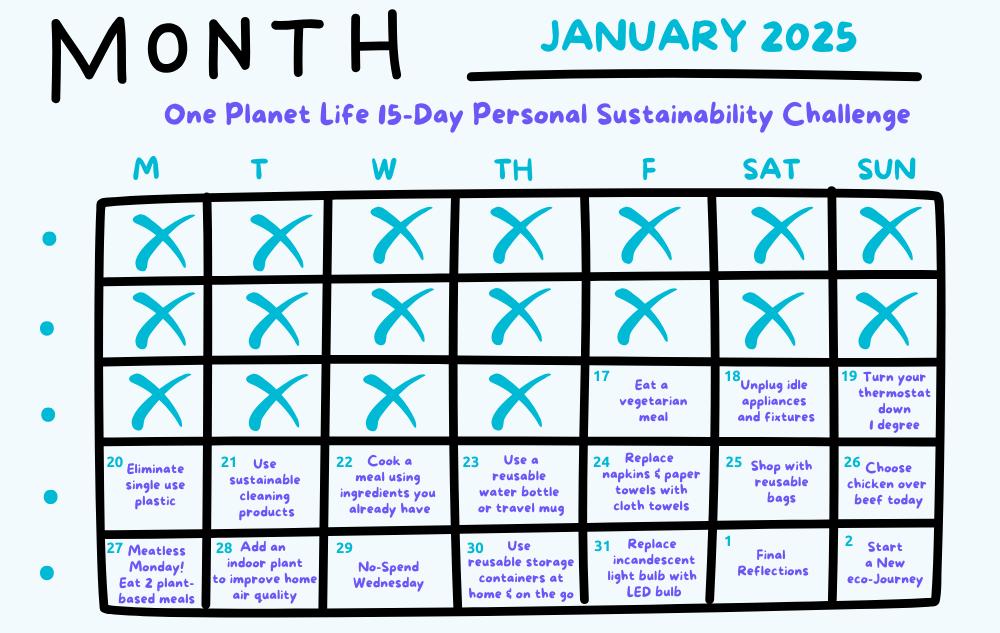Align your lifestyle with the health of our planet. Join OPL’s 15-day sustainability challenge and take the first step to a greener, more mindful life.
Choosing to live responsibly doesn’t require months of planning. It simply calls for deliberate thought and strategic planning – and OPL has mapped it all out for you! When you join OPL’s 15-day Personal Sustainability Challenge, you will cultivate habits that help you and the planet flourish.
Think Your Actions Don’t Have An Impact? You’re Wrong. It’s time to dispel the notion that the efforts of one person are inconsequential. Your actions matter in our fight against climate change.
GET STARTED: Download the One Planet Life App Today!
It’s free and simple to create an account. Joining our 15-Day Sustainability Challenge is an easy way to kick off your sustainability journey this year. During the Challenge, you’ll be asked to take one action each day for 15 days. The hope is that you’ll discover Joyful Changes that you can continue to do after the challenge is over. Over time, you can convert these changes to lasting, long-term habits.
Below is a breakdown of this year’s 15-Day Sustainability Challenge. We hope you’ll join us!

Day 1: Eat a vegetarian meal.
Why? Adopting a plant-based diet or reducing your meat consumption can significantly lower your carbon footprint. Livestock farming is a major contributor to methane emissions, a potent greenhouse gas. Transitioning to plant-based diets has the potential to reduce diet-related land use by 76% and diet-related greenhouse gas emissions by 49%, according to a 2022 study published by the National Institute of Health. Learn more about how emissions from food production are taking a toll on our environment.

Day 2: Unplug idle appliances and fixtures.
Why? Unplugging electronic devices and appliances when you’re not using them is a quick and easy way to slash energy vampires’ grip on your power usage. In fact, 23% of electricity consumed in homes is wasted by standby power.

Day 3: Turn your thermostat down 1 degree.
Why? Lowering your energy usage reduces your CO2 emissions and can also reduce your bill by 1% for each degree of change you make. Set your thermostat one (through five) degree(s) higher in the summer and one (through five) degree(s) lower in the winter, and the planet and your wallet will thank you!

Day 4: Eliminate single use plastic.
Why? Single-use plastics have infiltrated every part of our lives. The world now produces more than 380 million metric tons of plastic every year. Considering that only about 5-6% of U.S. plastics are recycled, much of it ends up in quickly expanding landfills and pollutes our natural green spaces and oceans. The average American throws away approximately 185 pounds of plastic a year – which never truly decomposes.

Day 5: Use sustainable cleaning products.
Why? Traditional cleaning products often contain a cocktail of harmful chemicals that can pose risks to both our health and the environment. Chemicals like ammonia, bleach, and phthalates are common ingredients found in many household cleaners. These substances are known to emit volatile organic compounds (VOCs), which can contribute to indoor air pollution. Prolonged exposure to these VOCs can lead to respiratory problems, allergies, and even more severe health issues. On top of that, many come packaged in plastic containers that live in our landfills forever. Learn how to keep your home clean without the unhealthy chemicals.

Day 6: Cook a meal using ingredients you already have.
Why? Food waste is a significant problem in the United States. Reducing household food waste is an easy way for individuals to make a profound difference in the fight against climate change. You can easily cut back on food waste in the kitchen by being a conscious consumer. Only buy what you can consume before expiry, consume fresh produce timely, and know what’s in your pantry.

Day 7: Use a reusable water bottle or travel mug.
Why? Plastic is pervasive in our culture, and lasts forever on our planet in the form of dangerous, ingestible microplastics. Microplastics are everywhere – polluting our waterways where it is ingested by wildlife and humans alike. Think bottled water is purer than tap water? Think again. Scientists have confirmed that bottled water contains up to 100 times more pieces of plastic than was previously estimated. Take a stand for your body and your planet by choosing reusable containers for the beverages you consume.

Day 8: Replace napkins and paper towels with cloth towels.
Why? Trees play a significant role in the health of our planet. But the demand for paper products has led to devastating deforestation in some of the world’s most biodiverse places. The World Counts reports that over 30 million acres of trees are felled annually to produce paper products. While paper products are convenient and useful, they require the wasting of natural resources that combat the effects of climate change. If you must use disposable paper products, choose sustainably produced or recycled options.

Day 9: Shop with reusable bags.
Why? Plastic, single-use bags are flimsy, difficult to recycle, and end up in our waterways where marine life confuses them for food. Mass-produced grocery and retail bags contribute to our global plastic pollution problem and have a direct impact on wildlife, as well as water and soil quality. Learn more about the harmful effects of plastic on our ecosystems. Then discover how microplastics are threatening biodiversity across the globe.

Day 10: Choose chicken over beef today.
Why? Not all animal proteins are created equal. As Our World in Data has reported, beef and lamb production have the greatest impact on the planet. This is partly because these animals naturally produce methane (a harmful greenhouse gas more potent than carbon dioxide) as they digest food. Emissions calculations for animal protein include land use. From converting peat soils for agricultural use, to growing crops for animal feed, to pasture management and fertilization, to slaughter waste, animal protein emissions add up. Read our blog to learn more about our food emissions crisis and how to limit your dietary carbon footprint.

Day 11: Meatless Monday! Eat two plant-based meals.
Why? Did you know that eating four vegetarian or vegan meals a week can save up to 748 lbs of carbon emissions annually? Many of the recipes featured on our website are nutrient-rich, plant-based, and planet-friendly. They are perfect for lunch, dinner, or your next gathering. Our recommended vegetarian cookbooks can also help you find inspiration for your next plant-based meal. There are lots of flavorful, vegetarian dishes to try! Track your planet-friendly meals on the One Planet Life app and make progress toward your goal of offsetting one ton of carbon emissions.

Day 12: Add an indoor plant to improve air quality.
Why? Plants add fresh oxygen into our homes and take in the carbon dioxide we breathe out. Now, that’s a beneficial relationship!

Day 13: It’s No-Spend Wednesday!
Why? We live in a culture of consumerism. While being a consumer is unavoidable, you can choose what type of a consumer you wish to be. Seek to be a conscious consumer by buying secondhand, shopping local, supporting sustainable or environmentally-responsible companies, and avoiding making unnecessary purchases. Our purchase choices have the power to shift demand in meaningful ways.

Day 14: Use reusable containers at home and on-the-go.
Why? Plastic pollution continues to contaminate our planet. But there are lots of reusable options to help you curb your plastic dependency. Consider investing in reusable and dishwasher-safe gallon, quart, sandwich, and snack bags. Kick the plastic wrap habit with reusable beeswax-coated wraps. Or repurpose plastic or glass containers your food comes in, like spaghetti sauce jars or cream cheese tubs.

Day 15: Replace incandescent light bulbs with LED light bulbs.
Why? LED lightbulbs use 75% less energy and last 25 times longer than incandescent bulbs. LEDs are also considered safer and more efficient. Traditional incandescent bulbs emit 98% of their energy as heat, while LEDs emit energy as 100% light with very little heat.
Tracking your actions is as important as taking action.
If you haven’t yet, be sure to download our free app and use it to track your impact during this challenge. If you are already using the One Planet Life app, join our 15-Day challenge and track challenge-specific Joyful Change each day. The goal of the sustainability challenge is to take daily action and slowly build lifelong habits toward a more sustainable lifestyle. Good luck and have fun!












